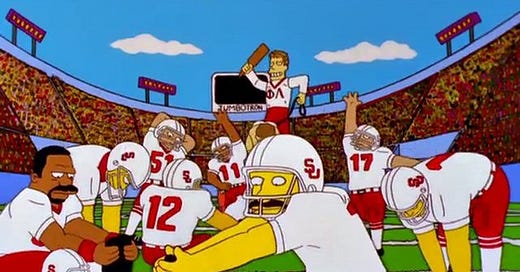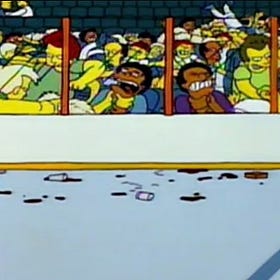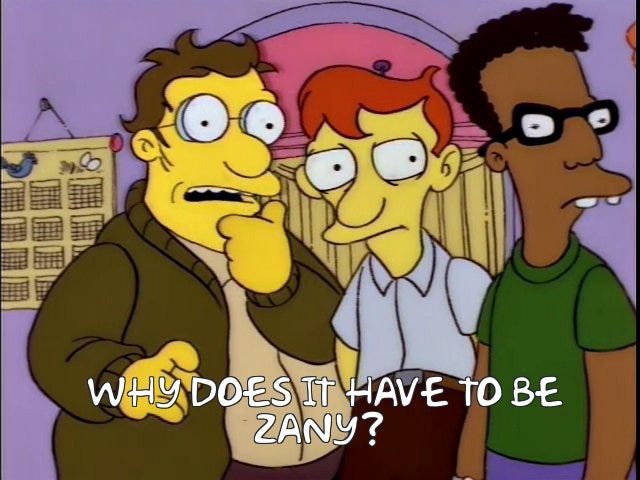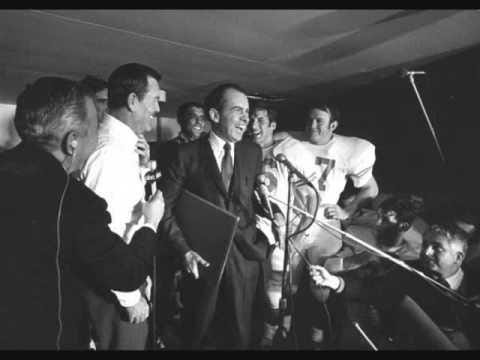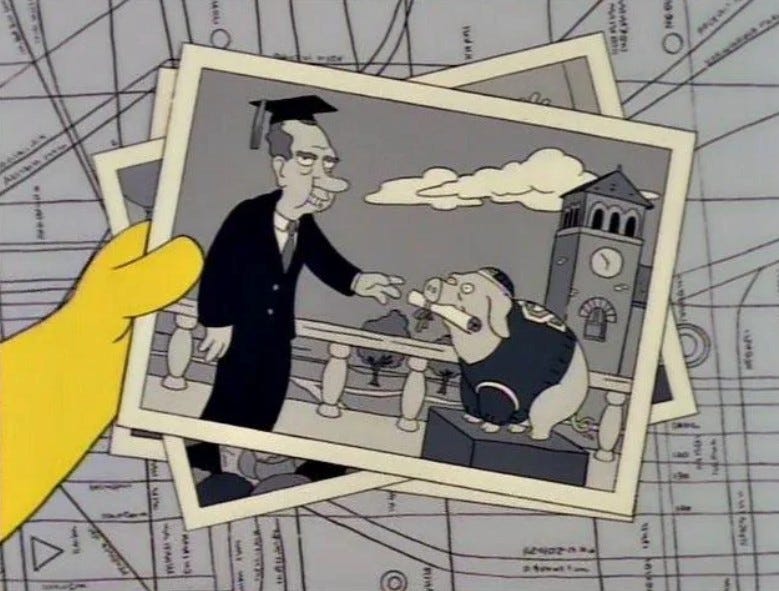Simpsons Saturday: "Faith Off"
Thirst for a bowl bid and the influence of gamblers loom over the start of the Springfield University football team in this Season 11 return to campus.
Welcome back to “Simpsons Saturday” here at Press Break! This series, revisiting sports-themed episodes of The Simpsons, went on a hiatus. But we’re back, baby! Before we dive into this comeback edition, please check out previous installments for a refresher:
Simpsons Saturday: Dancin' Homer
Welcome to Simpsons Saturday here on The Press Break, where every Saturday until the start of the college football — and possibly beyond — we revisit a sports-themed episode of the classic animated comedy.
Simpsons Saturday: Lisa On Ice
The Stanley Cup Finals are afoot as of this writing. However, to quote Radioactive Man, “But…for how long?”
Simpsons Saturday: 22 For 30
So I have a confession that might damage my credentials as a worthy chronicler of Simpsons sports history: I fell out of watching first-run episodes shortly after release of The Simpsons Movie.
With that, let’s dive into our first football-themed installment of Simpsons Saturday from a pivotal time in the show’s history.
Huckster spiritualists, problematic sports gambling and college football’s seedier elements laid bare for an enabling audience: While this could be a story set in 2025, we go back to the very beginning of the 21st Century and Season 11 of The Simpsons.
“Faith Off,” the 11th episode of the season, premiered on January 16, 2000. Two weeks earlier, the world successfully entered a new millennium despite fears of a Y2K crisis. Twelve days prior, Michael Vick came about as close to a player singlehandedly claiming a national championship ever has when he put on a show in the Sugar Bowl against Florida State.
Another college football star took center stage after all the confetti had been cleared from the Superdome, however: The Simpsons introduced the world to Anton Lubchenko.
Lubchenko is the All-American kicker…well, he’s an All-America selection but hails from a war-torn, unspecified Eastern European nation…and it’s his golden foot on which Springfield University’s hopes for a bowl berth lie.
By the outset of the 21st Century, The Simpsons writers came to rely on the false start as the show’s most common storytelling device. A storyline set up in the opening minutes tangentially led into the primary plot, oftentimes without one having any relation to the other.
The false start grew to become a trope I found lazy and formulaic, and in hindsight, I associate this device with my loss of interest in the show by the end of the 2000s. The recurrence of false starts really started to get going in Season 11, and that season marks a clear delineation of the creative team driving The Simpsons changing from its original core.
Speaking of the original Simpsons creatives, it’s somewhat ironic that the show’s first foray into college football came well after one of its creators who actually played college football left the team.
Well, Sam Simon kind of played college football. A Stanford Daily article after Simon’s death due to colon cancer in 2015 says that he quit the Cardinal football team after a single practice.
Simon’s four seasons on The Simpsons creative team add up to a virtual lifetime compared to his tenure with Stanford football. Still, to have even been recruited to play on The Farm in the same era that Stanford produced a Heisman Trophy winner in Jim Plunkett is a remarkable accomplishment — and not among Sam Simon’s most impressive athletic accomplishments.
Simon became involved in boxing during and immediately after his time on The Simpsons. It was an interest that culminated in Simon managing Lamon Brewster during Brewster’s 2004 WBO Heavyweight Championship win over Wladimir Klitschko.
Somehow, Sam Simon going from football dropout to Stanford Daily cartoonist to Simpsons creator seems less improbable than transitioning from Simpsons to Heavyweight Championship manager.
Anyway, I hope you appreciate this diversionary introduction into the athletic life of Sam Simon as an homage to the common Simpsons trope of a diversionary subplot to begin episodes. This device became increasingly annoying the longer it became a Simpsons staple — much like Family Guy and its over-reliance on cutaway gags the longer that series went on. In “Faith Off,” however, the misdirect at the beginning is called back later in the episode and proves critical to the main plot.
“Faith Off” opens with Homer attending a Springfield University alumni fundraiser, a reference to one of the series’ all-time classic episodes, Homer Goes to College. When Homer’s zany scheme1 intending to entrap the Springfield U. dean in a bucket of glow backfires, nothing can remove the container from the Simpson patriarch’s melon — until Bart, at Brother Faith’s traveling tent revival, pulls Homer free from the bucket.
This prompts Brother Faith2 to declare Bart has the gift, leading to one of the best musical montages in Simpsons history.
As Bart’s faith-healing endeavor crescendos then collapses at the expense of perennial punching bag Milhouse — who shares a name with football-obsessed president Richard M. Nixon!3 — Homer builds a float for the Springfield University Homecoming parade.
SU’s Homecoming game against rival Springfield A&M — which conferred an honorary to Richard Nixon, courtesy of mascot Sir Oinks-A-Lot!4 — is the school’s opportunity to secure a bowl bid.
Indeed, plenty is on the line in this clash. That includes the money illegally changing hands through Springfield’s resident mafioso “Fat” Tony and his gambling ring.
That “Faith Off” is a standout episode of Season 11 is no surprise; from his introduction in Season 3’s “Bart the Murderer,” storylines focusing heavily (no pun intended) on Don Marion Anthony D'Amico almost always delivered classics.
And while Fat Tony isn’t the focal point of “Faith Off,” he’s crucial to the climax. The money riding on Springfield U.’s win becomes a matter of life-and-death for Homer when he drunkenly drives his parade float — “A Salute to Hazing” — onto the field at halftime and crushes Anton Lubchenko’s kicking leg.
Only Bart’s faith healing can save Springfield University’s bowl aspirations and Homer’s life. Sadly, there’s no miracle that can spare Lubchenko the dire fate of being shuttled into a sham major in order to keep his grades up for football.
The episode’s satire of colleges overemphasizing football remains prescient 25 years later. So, too, does sport betting’s ugly role in the game — only now, rather than Fat Tony sitting in the audience threatening Homer with an ice pick, there are 21-year-old undergrads despondent that they wagered their entire Bursar’s check for the semester via an app on their phone.
And rather than Fat Tony being a mafioso, it sounds like the name of a Barstool blogger urging their viewership to smash that over on Fatty’s Can’t-Fail Same-Game Parlays of the Week.
Brother Faith’s grift and his endorsement of Bart parallels the plot of Season 5 episode, “Bart’s Inner Child,” in which self-help guru Brad Goodman pushes Bart’s philosophy to “do what you feel.” I’d love to know if this was an intentional choice when “Faith Off” was written, because if so, it would make Brother Faith’s persona bearing undeniable James Brown qualities a fun little Easter egg.
The Greatest Days in College Football History: Richard Nixon Becomes The Gridiron Star He Always Wanted to Be
I was the only out-front, openly hostile Peace Freak; the only one wearing old Levis and a ski jacket, the only one (no, there was one other) who’d smoked grass on Nixon’s big Greyhound press bus, and certainly the only one who habitually referred to the candidate as “the Dingbat.”

